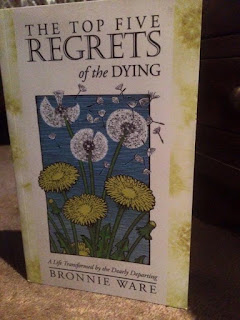
In her book, "The Top Five Regrets Of The Dying: a Life Transformed By The Dearly Departing" author Bronnie Ware shares an insight into the top five regrets of the dying, based on her experience of several years working in palliative care, looking after people in the last 12 weeks of their lives.
It makes for very interesting reading as she discovered there were five "regrets" that were expressed many more times than others. There was no mention of "I wish I'd lost more weight" "I wish I'd had more money" "I wish I'd travelled more" or "I wish I'd had more sex" even! No mention of the fast car they'd always wanted but never bought....or the house they'd always aspired to but never quite managed to buy.
The top five regrets of the dying are way more "basic" than the wish list above and all, without exception, are readily attainable by most of us:
1. "I wish I'd had the courage to live a life true to myself and not that others expected of me."
The most common regret of all. As their life was ebbing away from them, most realised that they had not fulfilled even half of their dreams. This was due to choices they had made or not made - many to please others or because they felt it was what was expected of them. Once their health began to deteriorate it was often too late.
2. "I wish I hadn't worked so hard."
How many of us, this author included, are guilty of this? Work, work, work - sometimes, often, the work-life balance is out of kilter. Long, working hours are spent away from the family we are working to support, milestones are missed as some of us become "busy fools". Every male patient Bronnie nursed expressed this regret as they spoke of missing their children growing up and the companionship of their wife.
3. "I wish I'd had the courage to express my feelings."
Many of Bronnie's patients suppressed their feelings in an attempt to keep the peace in their relationships, with an "anything for a quiet life" type mentality. That is fine but often they developed illnesses directly related to the resentment they carried as a result.
4. "I wish I had stayed in touch with my friends."
Everyone misses their friendships when they are dying. Many express regrets about not keeping hold of and cherishing those golden friendships as they were just too busy. Another day, week, month or year would pass without making a phone call, meeting up or keeping in touch. Bronnie found often when her patients expressed a need to be in touch with their friends that they could not be traced.
5. "I wish I had let myself be happier."
It sounds so simple, doesn't it? Be happy. Many of Bronnie's patients did not realise until the end of their life that they had a choice over whether to be happy or not. They were stuck in old ways and habits which did not bring them happiness. Fear of disruption or change left them pretending to others and themselves that they were content when deep down they longed to laugh properly and have silliness in their life again.
I find it fascinating that there are five common regrets. How many of the above do you identify with? It would be nice to think that the loved ones of anyone reading this post would be able to say, on your death: "They lived and laughed, loved and left."
Live a life without regrets - before it's too late.